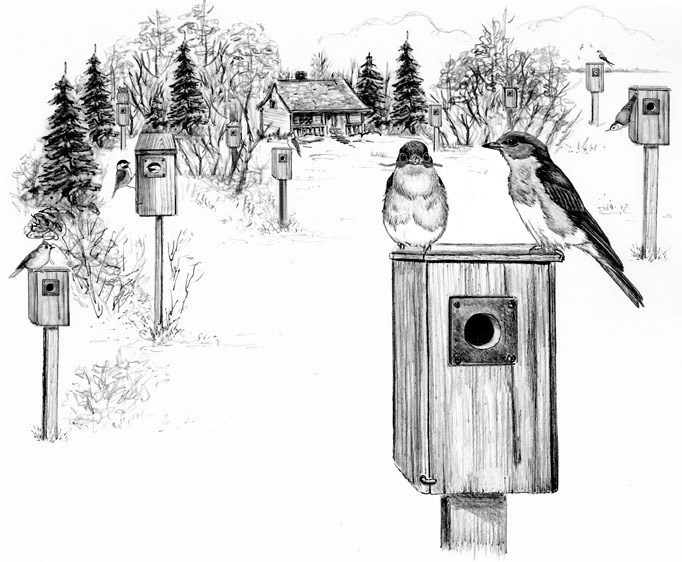
Dear Bird Folks,
This spring our nest boxes produced several families of birds. We had a family of bluebirds, plus Tree Swallows, chickadees, titmice and nuthatches. Now that the babies have moved out, I’m wondering if I should cleanout the boxes right away. Also, do you think any of these birds will try to raise a second family?
– Charles, Brewster, MA
So, it’s you, Charles,
You are the one who’s been getting all the birds. A lot of people on the Cape have been complaining that birds aren’t using the boxes I’ve sold them. Now I know the reason why. Every bird is nesting in your yard. This is not good. Your productive yard is making me look bad. I suggest you take your boxes down at once. If you don’t do as I say, I may be forced to take action. Just one word from me, and your birdhouses would disappear without a trace. All I have to do is place a call to my buddy, “Whitey,” and the deed would be done. However, this action may not happen for a while. Suddenly, Whitey isn’t answering his phone. Gee, I hope nothing has happened to him.
There are two things I like about your note, Charles. First of all, regardless of what I just said, it’s good that you have a lot of birdhouses on your property. This is the best way to prevent power struggles between birds and to avoid personal disappointment. Too many folks put up a single bluebird house and then get upset when chickadees move in instead of bluebirds. I try to explain that the resident chickadees will likely claim a box before the bluebirds return in the spring. Chickadees don’t understand that your box is meant only for bluebirds. It’s like trying to explain to your dog that couches are meant only for people. You’re just wasting your time.
I also like that you are concerned about cleaning your boxes. This is a very good idea. Birds appear to be sleek and clean, but they can be loaded with lice, mites and sometimes cooties. These little pests may remain in the nest after the bird family has departed. They then transfer themselves onto the next batch of baby birds, often with unpleasant results. In addition, some old nests may contain rotten or broken eggs, or even a dead chick. No bird wants to start a family while there’s still a rotting corpse in the nest. It’s bad Karma.
Here’s another reason to regularly inspect your nest boxes. A few weeks ago a pair of Tree Swallows attempted to build a nest in a birdhouse right behind our store. I was thrilled. I was also quite surprised because the back of our shop is not really ideal breeding habitat for any creature, except for maybe rats. Yet, between the dumpster, the asphalt parking lot and the customers lined up to complain about squirrels, a pair of swallows wanted to raise their family. Sadly, after checking out our box they moved on. Why? What was wrong? It turns out that hornets had already started to build a nest in that box and I hadn’t noticed them. Darn! I was so upset that I couldn’t even talk, except to tell one of our new employees that he had been awarded the title of “Official Hornet Remover.” (I love new employees.)
I recommend cleaning your boxes as soon the young birds have moved out. How do we know when the birds have left? Just watch for the lack of activity. When parents are feeding their kids they are in and out of the box every few minutes. When you no longer see any action around the nest the kids are probably gone. However, you won’t know for sure if they’re gone until you open the box and look inside. Lots of folks are freaked out by the thought of “disturbing” a nest. Relax. It’s fine. Adult birds aren’t about to abandon their babies just because you opened the box and stuck your big nose in it. And speaking of noses, don’t believe the old wives’ tale. The birds won’t smell you, no matter how bad you stink.
The answer to your question about birds having a second brood is no, maybe and probably. Nuthatches and Tree Swallows typically don’t have a second brood, but chickadees and titmice occasionally do. The birds most likely to hatch out another family are bluebirds. Last week, Dot (from Eastham MA) sent me a beautiful picture of a male bluebird feeding mealworm to his hungry kids. She also reported that while the dad was busy with the fledglings, the female was getting the nest box ready for family number two. Bluebirds like to do a lot of breeding. Apparently, they aren’t as innocent as they look.
Sometimes birds appear to be raising a second family when in fact they haven’t even raised one yet. Often earlier nesting attempts fail due to predators, weather or an assortment of other problems. When this happens the birds typically re-nest in a new location. Many late-in-the-season nesting attempts are made by birds that didn’t get it right the first time. So again, keep your boxes ready.
Congrats on your fertile yard, Charles. I think having several nest boxes is the key to your success. Some cynics will say that I encourage folks to put up more birdhouses so I can sell more birdhouses, but nothing could be further from the truth. In fact, I’m offended anyone would even think that. I encourage more birdhouses so birds will have more families and thus there will be more hungry birds around. More hungry birds means I’ll sell more feeders and more birdseed. That’s where the real money is.